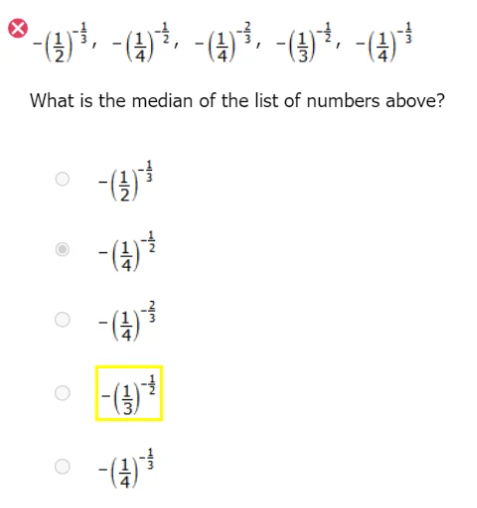Events & Promotions
|
|

GMAT Club Daily Prep
Thank you for using the timer - this advanced tool can estimate your performance and suggest more practice questions. We have subscribed you to Daily Prep Questions via email.
Customized
for You
Track
Your Progress
Practice
Pays
Not interested in getting valuable practice questions and articles delivered to your email? No problem, unsubscribe here.
- Nov 22
11:00 AM IST
-01:00 PM IST
Do RC/MSR passages scare you? e-GMAT is conducting a masterclass to help you learn – Learn effective reading strategies Tackle difficult RC & MSR with confidence Excel in timed test environment - Nov 23
11:00 AM IST
-01:00 PM IST
Attend this free GMAT Algebra Webinar and learn how to master the most challenging Inequalities and Absolute Value problems with ease. - Nov 25
10:00 AM EST
-11:00 AM EST
Prefer video-based learning? The Target Test Prep OnDemand course is a one-of-a-kind video masterclass featuring 400 hours of lecture-style teaching by Scott Woodbury-Stewart, founder of Target Test Prep and one of the most accomplished GMAT instructors.
Kudos
Bookmarks
D
Be sure to select an answer first to save it in the Error Log before revealing the correct answer (OA)!
Difficulty:
 95%
(hard)
95%
(hard)
Question Stats:
58% (02:36) correct 42%
(02:39)
wrong
42%
(02:39)
wrong  based on 1007
sessions
based on 1007
sessions
History
Date
Time
Result
Not Attempted Yet
\(-(\frac{1}{2})^{-\frac{1}{3}}, \quad -(\frac{1}{4})^{-\frac{1}{2}}, \quad -(\frac{1}{4})^{-\frac{2}{3}},\quad -(\frac{1}{3})^{-\frac{1}{2}}, \quad -(\frac{1}{4})^{-\frac{1}{3}}\)
What is the median of the list of numbers above?
A. \(-(\frac{1}{2})^{-\frac{1}{3}}\)
B. \(-(\frac{1}{4})^{-\frac{1}{2}}\)
C. \(-(\frac{1}{4})^{-\frac{2}{3}}\)
D. \(-(\frac{1}{3})^{-\frac{1}{2}}\)
E. \(-(\frac{1}{4})^{-\frac{1}{3}}\)

Screenshot 2024-01-01 181734.png [ 62.01 KiB | Viewed 16240 times ]
What is the median of the list of numbers above?
A. \(-(\frac{1}{2})^{-\frac{1}{3}}\)
B. \(-(\frac{1}{4})^{-\frac{1}{2}}\)
C. \(-(\frac{1}{4})^{-\frac{2}{3}}\)
D. \(-(\frac{1}{3})^{-\frac{1}{2}}\)
E. \(-(\frac{1}{4})^{-\frac{1}{3}}\)
Attachment:
Screenshot 2024-01-01 181734.png [ 62.01 KiB | Viewed 16240 times ]
Kudos
Bookmarks
gmatophobia
\(-(\frac{1}{2})^{-\frac{1}{3}}, \quad -(\frac{1}{4})^{-\frac{1}{2}}, \quad -(\frac{1}{4})^{-\frac{2}{3}},\quad -(\frac{1}{3})^{-\frac{1}{2}}, \quad -(\frac{1}{4})^{-\frac{1}{3}}\)
let us convert the negative power to positive power
\(-(2)^{\frac{1}{3}}, \quad -(4)^{\frac{1}{2}}, \quad -(4)^{\frac{2}{3}},\quad -(3)^{\frac{1}{2}}, \quad -(4)^{\frac{1}{3}}\)
Now let us raise all to same power 1/6
\(-(2^2)^{\frac{1}{6}}, \quad -(4^3)^{\frac{1}{6}}, \quad -(4^4)^{\frac{1}{6}},\quad -(3^3)^{\frac{1}{6}}, \quad -(4^2)^{\frac{1}{6}}\)
\(-(4)^{\frac{1}{6}}, \quad -(64)^{\frac{1}{6}}, \quad -(256)^{\frac{1}{6}},\quad -(27)^{\frac{1}{6}}, \quad -(16)^{\frac{1}{6}}\)
Now all raised to same power. So, if we discard '-' sign for this step, the increasing order will be
\((256)^{\frac{1}{6}}> \quad (64)^{\frac{1}{6}}> \quad (27)^{\frac{1}{6}}>\quad (16)^{\frac{1}{6}}> \quad (4)^{\frac{1}{6}}\)
All though the median will remain the same, let us change the sign by multiplying by - sign
\(-(256)^{\frac{1}{6}}< \quad -(64)^{\frac{1}{6}}< \quad -(27)^{\frac{1}{6}}<\quad -(16)^{\frac{1}{6}}< \quad -(4)^{\frac{1}{6}}\)
Answer: D. \(-(\frac{1}{3})^{-\frac{1}{2}}\)
gmatophobia
Here is the video solution to this question: https://youtu.be/PQMxKCld65M
I note that each term has a minus in front of it but it is not included in the exponent. So I will ignore all minus signs since we have 5 numbers so median will be the middle number. It will not change whether we put the numbers in increasing or decreasing order. The middle term will be the one whose magnitude is in the middle.
Next I will remove minus signs from the exponents by flipping the bases. I get:
\(2^{\frac{1}{3}} , 4^{\frac{1}{2}} , 4^{\frac{2}{3}} , 3^{\frac{1}{2}} , 4^{\frac{1}{3}} \)
Now, I can simply raise them all to the 6th power. Their relative positioning will stay the same since they all are positive numbers greater than 1
\(2^2, 4^3, 4^4, 3^3, 4^2\)
=\(4, 64, 256, 27, 16\)
Median is 27 which is actually \(-(\frac{1}{3})^{-\frac{1}{2}}\)
Answer (D)
Check discussions on exponents here:
Exponents: https://youtu.be/ibDqnatAMG8
Exponents On number line: https://youtu.be/0rpppnnJNRs













